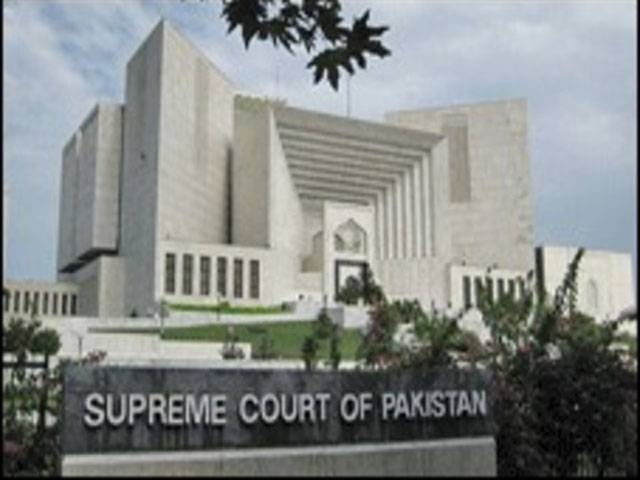ISLAMABAD - Under the mandate of the Constitution, the judiciary has to intervene whenever any state organ exceeds its prescribed limits, said Chief Justice Iftikahr Muhammad Chaudhry while addressing a gathering at the opening ceremony of new Judicial Year 2013-14.
Article 184(3) confers concurrent jurisdiction on the Supreme Court to intervene and redress the grievances and problems of the citizens as regard to violation of their fundamental rights where an issue of public importance is involved, he said.
The Chief Justice said under Article 184(3) of the Constitution, the cases are registered through formal submission of petitions submitted by a party in person or through his counsel. Petitions are also entertained from individuals and communities who are socially or financially or politically disadvantaged, and as such not getting redress at the local level or from the executive. “It is not for me to say as to whether the role of the Supreme Court in this regard is well-received or ill-received. I shall leave this question to the future historian to determine.”
He said Indian Supreme Court, besides hearing appeals and cases against the judgements of the subordinate courts, also hear ‘Public Interest Litigation’, and initiates proceedings itself (suo moto). “During the 1980s and early 1990s, the court issued a number of landmark judgements, including key rulings on the rights of prisoners, bonded labourers, pavement dwellers, and children,” the CJP said.
There are many evils in the society but corruption is on the top of the list. He referred the case of an ex-prime minister allegedly extended favours to the senators, members of the National Assembly, provincial assemblies, notables and other functionaries by generously distributing funds to the tune of Rs 52 billion.
He said that judiciary giving preference to old cases, and even in the Supreme Court, the old cases are being heard on priority basis, besides fresh cases. Petitions for urgent hearing are also entertained and cases are fixed if sufficient cause is shown.
From the 1st September 2012 to 6th September 2013, against the institution of 18,105 new cases, 18,927 cases were disposed of; resultantly the net balance was reduced to 20,089 cases. Similarly, the Human Right Cell in the Supreme Court from 1st September 2012 to 7th September 2013 received 45,040 complaints, while 46,287 complaints were disposed of and the balance is of 17,577 complaints.
Justice Chaudhry apprised that since June 2009 till now, the judiciary has decided 11.75 million cases against the institution of 11.56 million new cases, resulting in reduction of backlog to the extent of 184,142 cases.
The National Judicial (Policy Making) Committee sent formal requests to the governments to increase the number of judicial officers and strengthening the court infrastructure. However, only the demand of Lahore High Court for 317 posts of ADJs and 696 posts of civil judge-cum-judicial magistrates has been adhered to by the Punjab government and initially an amount of Rs 1 billion has been sanctioned for that purpose.
About the issue of missing persons, the Chief Justice said that the court has made every effort to ensure that all the missing persons are accounted for. “The constitution now provides for the right to fair trial for the determination of civil rights or obligations as well as any criminal charge against the person. Regrettably, no proper policy has been formulated yet by the federal government to ensure compliance with the constitutional safeguards.”
He said after the application of National Judicial Policy and continuous monitoring, the situation regarding eradication of corruption in the lower judiciary has improved considerably. “But there is a dire need to strengthen the surveillance systems of the courts at district level for which I will urge the members of the Bar to come forward and join us to eradicate corruption in its forms and manifestation.”
Attorney General for Pakistan, Vice-Chairman Pakistan Bar Council, and President Supreme Court Bar Association also spoke on the occasion.
Pakistan Bar Council Vice Chairman Qalbi Hassan has said that it is almost a routine affair that advocates from outstations have to wait till late hours for their turn but are adjourned due to paucity of time, which cause great inconvenience and wastage of time to lawyers and financial burden on the litigants. He urged the Chief Justice to fix only that number of cases, which could easily be taken up and heard.
He also objected to the CJP addresses to returning officers and deputy returning officers before and after May 11 general elections. Qalbi Hassain stated the CJP addresses were not appreciated rather it provided excuse to some of the political parties and their leaders to unnecessary criticise the judiciary.
Showing concern over the use of contempt of court’s power by the SC, Qalb-i-Hassan said that frequent resort to contempt of court law not only eclipses the basic fundamental right of freedom of expression of a citizen but in the long run also bounces back and exposes the judges to public criticism which adversely reflects upon the majesty of law.
Addressing on the occasion, SCBA President Mian Asrar ul Haq has opposed the Lahore High Court Bar Association’s move about sending a reference to the Supreme Judicial Council against the CJP and two other judges. “The SCBA is of the view that this was a ridiculous and unauthorised move. We are with the independent, honest and strong judiciary,” he added.
Sunday, May 19, 2024
Requests to increase judges number yet unmet: CJP

NEPRA’s Neglect
May 19, 2024
Slovak PM shooting: Suspect in detention
May 19, 2024
Flash floods kill 50 in Afghanistan
May 19, 2024
Sports & Genocide
May 18, 2024
Healing AJK
May 18, 2024
A New World Order
May 18, 2024
Tobacco Toll
May 17, 2024
Rushed Reforms
May 17, 2024
Continuing Narrative of Nakba
May 18, 2024
Teacher Struggles
May 18, 2024
No Filers out of Reach
May 18, 2024
Hoax of Inflation Coming Down
May 17, 2024
Rising Inflation
May 17, 2024
ePaper - Nawaiwaqt
Advertisement
Nawaiwaqt Group | Copyright © 2024





